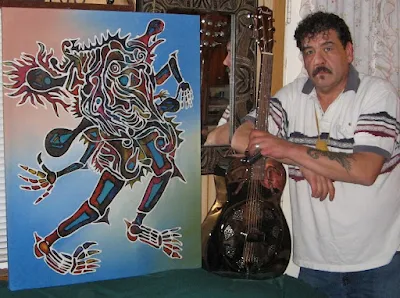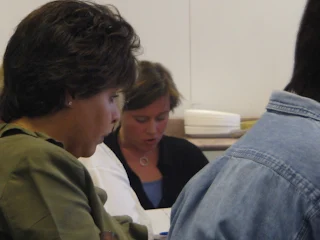| Randy dabbles with paint as well |
(“It is delicious!”) He made snares from broken guitar strings. He cooked rabbit over fire and on a barbeque. He used McDonald’s Restaurant condiments to spice up the meal.
Until landing in this peculiar estate, Randy was living a pure Canadian’s dream in Yellowknife, NWT, during the 1990s, earning large wages pipefitting for mining operations. On a given two-week break from the working life Randy would depart the north to join top-flight blues and country musicians to play lead or bass guitar and sing many of his own songs (for he is an accomplished songwriter). He played in Guam, Finland, and elsewhere in the world.
The life he made for himself in the north was percolating, and in it he was able to do most of what he wanted, including drugs and alcohol,. If life couldn’t get any better, well, a few turns of the screw would soon make it worse, then worse, then much, much worse progressively forming habits two or three. The slide onto an urban trap line began after his common-law wife in Yellowknife announced she was pregnant and hit him hard by announcing the child belonged to somebody else. This announcement caused him to depart job, city, and territory to live on the road.
He went south to find a band and live in a suitcase in hotels where he played across Canada. As time went by addiction grew into a ticking time bomb that threatened to blow away everything. And blow it did on New Year’s Eve in the year 2000 when a crisis occurred. They played in the band for the promise of a large New Year’s Eve paycheque and after the event members of the band awoke to find cheques that were worthless, while the leader of the band stole the entire hotelier’s payment. This loss was doubled by the tragic reaction of a close friend and band member when friend and fellow musician met desperation and betrayal by committing suicide.
Randy looks back and sees the picture clearly today, but at the time it was incomprehensible. Randy’s mental outlook sank into depression, which he vividly recalls was triggered by, “doubting if my dream of a life in music was anything but a nightmare.” His own crushing depression ensued and Randy decided to ‘step off’ stage. He abandoned the musical profession by selling an expensive set of Stratocaster guitars and amplifiers and all of his equipment and divesting of other worldly possessions. He checked out of society, not in stages, but like it was some kind of hotel; he left all at once. He leapt full-time into a life of triple addiction and burned through his will chasing cocaine, heroin, and alcohol.
He played a battered guitar on the mean street corners, and in the underground stations of Edmonton’s Light Rail Transit system, and arranged himself a cost-efficient accommodation under a bridge (says he became a troll), and later, a parking garage under the high-priced real estate of the valley, and got wrecked on everything he could lay his hands on while enduring all-Canadian seasons in the bare comfort of whatever hovel he managed to scrape together.
Perhaps the lonely years spent in hotels as a musician had equipped him for such a crash. At first he depended on friends by sleeping on their couches and supplying them with a share of the drugs, and as the clock turned backwards and backwards the need for drugs grew more selfish, and, as the rapidity of progression into addiction increased to terminal velocity he was mainly left alone to face his demons or escape them by getting smashed.
The 1990s became a faded memory of moments of glory on stage and a terrible sadness found in between. Life became an uphill struggle, trudging every step to the next, spending it all if possible within an inescapable ‘maze’ of addiction. Music has been a driving force in Randy’s life, “It is genetic,” ascribing this inheritance to Métis heritage, as he later learned, “My mother’s brother was a gifted player,” who became well known in Winnipeg as a singer songwriter and guitar player.
He learned about this lineage later in life, where he came from, including that his great grandfather had been Canadian voyageur, a courier de bois (runner of the woods). “I saw a picture of him and asked my grandmother why he had crease marks on his forehead and sides of his face. She told me the markings came from pulling York Boats upstream,” from the leather strapping to pull heavy watercraft upstream and portage over land. This true Manitoban Canadian had earned these distinctive facial markings by the work he did for the Hudson’s Bay Company. He carried mercantile trading goods from Winnipeg to Norway House and back, one long arduous voyage every year.
It turned out Randy has the purest form of Western Canadian heritage there is. Important details like family history were missing from his youth, by the fact he was adopted out by his biological mother, whom he did not meet until he was 37 old. And the close relationship with an adoptive family was interrupted by the period spent snaring rabbits in Edmonton’s river valley, and, before that, addictive behaviour.
Randy was raised by adoption into a family, and this wasn’t half bad. “My father gave me a trade as a pipefitter. He taught me a lot,” and was always generous to his adoptive son. His mother could not have children so they adopted Randy and his sister. It had been a normal childhood spent in a family environment and he felt nurtured far more than deprived, it was a good family environment and he feels he was blessed by it.
Later the nurturing away from addiction came from detox facilities and treatment centres and creating art as therapy, and the 12 step program that helped him to fill his medicine pouch used to form a powerful spiritual foundation, including later a faith in the Living God, his Higher Power. SEE Angelique Merasty Levac











